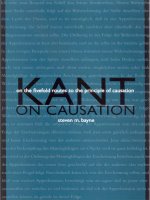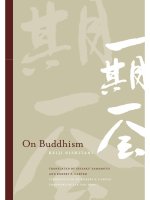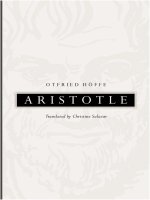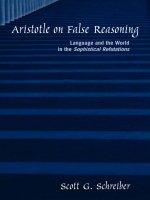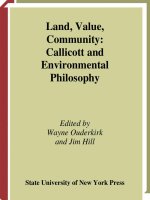state university of new york press aristotle mar 2003
Bạn đang xem bản rút gọn của tài liệu. Xem và tải ngay bản đầy đủ của tài liệu tại đây (1.04 MB, 252 trang )
ARISTOTLE
SUNY series in
ANCIENT GREEK PHILOSOPHY
Anthony Preus, editor
OTFRIED HÖFFE
Translated by Christine Salazar
STATE UNIVERSITY OF NEW YORK PRESS
ARISTOTLE
Published by
STATE UNIVERSITY OF NEW YORK PRESS
ALBANY
© 2003 State University of New York
All rights reserved
Printed in the United States of America
No part of this book may be used or reproduced in any manner whatsoever
without written permission. No part of this book may be stored in a retrieval
system or transmitted in any form or by any means including electronic,
electrostatic, magnetic tape, mechanical, photocopying, recording, or otherwise
without the prior permission in writing of the publisher.
For information, address
State University of New York Press
90 State Street, Suite 700, Albany, NY 12207
Production, Laurie Searl
Marketing, Anne M. Valentine
Library of Congress Cataloging-in-Publication Data
Hoffe, Otfried.
Aristotle / Otfried Hoffe.
p.
.
cm. (SUNY series in ancient Greek philosophy)
Includes bibliographical references and indexes.
ISBN 0-7914-5633-1 (alk. paper) ISBN 0-7914-5634-X (pbk. : alk. paper)
1. Aristotle. I. Title. II. Series
B485 . H56 2003
185 dc21 2002075875
10987654321
.
.
.
Originally published in German by
Verlag C. H. Beck, Munich
IT BEGAN WITH ARISTOTLE . . .
For Evelyn
This page intentionally left blank.
CONTENTS
List of Illustrations xi
List of Abbreviations and Method of Citation xiii
Preface xv
P
ART I“T
HE PHILOSOPHER”?
1 The Man and His Work 3
1.1 The Man
1.2 The Work
2 Researcher, Scholar, and Philosopher 15
P
ART II K
NOWLEDGE AND SCIENCE
3 The Phenomenology of Knowledge 23
3.1 Propaedeutic?
3.2 An Epistemic Hierarchy
3.3 Freedom and Self-realization
4 Forms of Rationality 31
4.1 Syllogistics
4.2
Dialectic (Topics)
4.3 Rhetoric
4.4 Poetics: Tragedy
5 Proofs and Principles 49
5.1 A Critique of Demonstrative Reason
5.2 Axioms and Other Principles
5.3 Induction and Mind
6 Four Methodical Maxims 61
6.1 Establishing the Phenomena
vii
6.2 Doctrines
6.3 Difficulties
6.4 Linguistic Analysis
P
ART III PHYSICS AND METAPHYSICS
7 Natural Philosophy 69
7.1 Aristotelian Natural Science
7.2 Motion
7.3 The Four Causes
7.4 Continuum, the Infinite, Place, and Time
8 Biology and Psychology 85
8.1 Aristotle the Zoologist
8.2 Teleonomy: Organisms, Procreation, and Heredity
8.3 The Soul
9 First Philosophy, or Metaphysics 95
10 Cosmology and Theology 103
10.1 Meta-physics
10.2 The Cosmological Concept of God
10.3 An Ethical Concept of God?
11 Ontology and Language 111
11.1 Categories
11.2 Substance
11.3 Aristotle’s Critique of Plato’s Ideas
11.4 On Language
P
ART IV ETHICS AND POLITICS
12 Practical Philosophy 129
12.1 The Autonomy of Ethics
12.2 The Goal Is Action
12.3 Outline Knowledge
13 Theory of Action 135
13.1 The Basic Concept of Desire
13.2 Decision and Power of Judgment
13.3 Weakness of the Will
13.4 Does Aristotle Know the Concept of Will?
14 The Good Life 147
14.1 The Principle of Happiness
14.2 The Virtues of Character
14.3 Justice, Natural Law, and Equity
14.4 Theoretical or Political Existence?
viii CONTENTS
15 Political Anthropology 163
15.1 The Relevance of the Politics
15.2 “Political by Nature”
15.3 Friendship and Other Prerequisites
16 Political Justice 175
16.1 Elementary Inequalities
16.2 Rule of the Free over the Free
16.3 Democracy or Polity?
PART V The RECEPTION
17 Antiquity and the Middle Ages 189
17.1 Antiquity
17.2 Christianity, Islam, and Judaism
17.3 The Great Aristotelian Renaissance
18 The Modern Age and the Present 199
18.1 Detachment and Renewed Interest
18.2 Aristotle Research and Neo-Aristotelianisms
Chronology 205
Bibliography 209
Index of Personal Names
225
General Index 231
Contents ix
This page intentionally left blank.
ILLUSTRATIONS
1. Plato. Roman copy (from the reign of Tiberius) of a portrait
statue made in the middle of the fourth century B.C.E.
(Munich, Glyptothek). 4
2. Detail (Alexander) of a battle between Alexander the Great and
Darius. Pompei, House of the Faun; probably based on an original
by Philoxenus of Eritrea. 7
3. Socrates. Copy of a Hellenistic bust (Rome, Villa Albani). 8
4. Aristotle. Roman copy based on a fourth-century B.C.E. statue
(Vienna, Kunsthistorisches Museum). 9
5. Detail (Plato and Aristotle) from Raphael, The School of Athens
(Rome, Vatican, Stanza della Segnatura). 120
6. Aristotle (Portal Royal of Chartres Cathedral, twelfth century). 194
7. Aristotle at his lectern; MS of the writings on natural sciences,
Rome 1457 (Vienna, Österreichische Nationalbibliothek,
Cod. phil. gr. 64). 197
xi
This page intentionally left blank.
ABBREVIATIONS AND
METHOD OF CITATION
Ath. Athênaiôn Politeia: The State of the Athenians
APo. Analytica Posteriora (Analytika hystera): Posterior Analytics
APr Analytica Priora (Analytika protera): Prior Analytics
Cael. de Caelo (Peri ouranou): On the Heaven
Cat. Categoriae (Katêgoriai): Categories
de An. de Anima (Peri psychês): On the Soul
EE Ethica Eudemia (Ethika Eudêmeia): Eudemian Ethics
EN Ethica Nicomachea (Ethika Nikomacheia): Nicomachean Ethics
GA de Generatione Animalium (Peri zôôn geneseôs): On the Generation of Animals
GC de Generatione et Corruptione (Peri geneseôs kai phthoras): On Coming to Be and
Passing Away
HA Historia Animalium (Peri tôn zôôn historiai): On the History of Animals
Int. de Interpretatione (Peri hermêneias): Hermeneutics
MA de Motu Animalium (Peri zôôn kinêseôs): On the Movement of Animals
Metaph. Metaphysica (Ta meta ta physika): Metaphysics
Mete. Meteorologica (Meteôrologika): Meteorology
MM Magna Moralia (Ethikôn Megalôn): Magna Moralia
PA de Partibus Animalium (Peri zôôn moriôn): On the Parts of Animals
Ph. Physica (Physikê akroasis): Physics
Po. Poetica (Peri poietikês): Poetics
Pol. Politica (Politika): Politics
Prot. Protrepticus (Protreptikos): Protrepticus
Rh. Rhetorica (Rhêtorikê technê): Rhetoric
SE Sophistici Elenchi (Peri sophistikôn elenchôn): Sophistical Refutations (= Topics IX)
Top. Topica (Topika): Topics
Where they are available, the text is translated from the Oxford Classical Texts
editions. Passages are cited as follows: Metaph. I 1, 981a15 = Metaphysics book I,
chapter 1, page 981a (of the respective Bekker edition), line 15.
xiii
This page intentionally left blank.
PREFACE
This book introduces a philosopher who is in a class by himself, even within the
small circle of great thinkers. In late antiquity he was called “divine Aristotle” (by
Proclus). For the Middle Ages, from al-Farabi to Thomas Aquinas by way of Al-
bertus Magnus, he was quite simply “the Philosopher.” Even Leibniz said that
Aristotle’s utterances about the basic concepts of natural philosophy were “for the
most part entirely true.”
Rather than within a few decades, a serious attack on Aristotle’s authority did
not occur until two millennia later, in the seventeenth and eighteenth centuries, but
when it did happen, it came on a wide front. The attack began in physics (cue:
Galileo); it continued in fundamental (Descartes) and political (Hobbes) philoso-
phy, was reinforced by transcendental philosophy (Kant), embraced ethics and aes-
thetics and, at the end of the nineteenth century, finally reached logic. However,
even then Aristotle was not simply passé. It is well known that Hegel treated him
with great respect; similarly Brentano and Heidegger, as well as Lukasiewicz and the
analytical philosophers. Even among biologists, none less than Darwin himself held
him in great regard. While until recently criticism of Aristotelian positions—from
essentialism through teleology to the principle of happiness—has prevailed, these
days there are pro-Aristotelians in the fields of the philosophical theory of action, in
ethics, topics and rhetoric, political philosophy, social theory, and even ontology.
Given that, despite all this, knowledge of Aristotle cannot be expected even
from students of philosophy, this volume is an attempt to provide a comprehen-
sive introduction to Aristotle with the intent of making him more popular. There
is also the added interest of a philosophical dialogue that bridges the centuries, for
it would be sterile to bar practical questions while merely repeating his tenets.
With Aristotle in particular, one is always faced with the objects of his philoso-
phizing. Thus, we are interested in what the philosopher says, how he conducts his
argumentation, and what remains of the intuitions, the concepts and arguments,
or at least his style of philosophizing. Also, a confrontation with Aristotle is help-
ful for gaining a clearer view both of antiquity and of our own times. Occasionally
this may open up a viable alternative to current thought.
No one should be deterred by the boundless wealth of commentaries on an au-
thor such as Aristotle: a considerable number of texts allow for unprepared reading.
xv
Frequently his thoughts are expressed with such freshness that one only needs a bit
of curiosity and patience to understand them. Some texts can even be read “in one
go” like a novel, but one should not “devour” Aristotle chapter by chapter, like a
murder mystery. Beginners should start with the first book of Metaphysics (esp. chs.
I 1–2) and the Nicomachean Ethics (esp. chs. I 1–6), and then turn to the initial
chapter of the Zoology (HA I 1), the first chapters of the work on categories and per-
haps also the opening of the Physics. It is—almost—self-evident that there are more
difficult texts as well (e.g., de An. III 5, Metaph. VII–IX, Int. 12-14, EN VII 1–11),
that others can only be decoded if one has certain preliminary knowledge (e.g.,
Metaph. XIII–XIV), and that here and there one encounters obscure, and even con-
tradictory, passages.
The result of a series of lectures, this book owes much to the various sugges-
tions given by my students, in particular Dr. Christoph Horn, Dr. Christof Rapp,
and Rolf Geiger.
xvi PREFACE
PART I
“THE PHILOSOPHER”?
This page intentionally left blank.
1
THE MAN AND HIS WORK
Pantes anthrôpoi tou eidenai oregontai physei: “all humans strive for knowledge by
nature.” The opening sentence of one of the most famous books in Western civi-
lization, Aristotle’s Metaphysics, explicitly speaks about man and knowledge and
implicitly about its author as well. As far as the anthropological claim—a natural
craving for knowledge—applies, Aristotle is not only an exceptional thinker, but
also a great human being.
1.1 THE MAN
It is surprising that we have only a very general idea of Aristotle’s personality and
biography. The scarce evidence consists of the Testament, various letters and
poems, as well as honorary decrees of Stagira, Delphi, and Athens. Ancient bi-
ographies, on the other hand, can only be trusted to a limited extent. Compiled
generations after his lifetime, some have pro-Aristotelian, others anti-Aristotelian
bias. The best-known text—in Diogenes Laertius’s Lives and Opinions of Famous
Philosophers (220 C.E. ch. VI)—combines fact and, not always benevolent, fiction
(cf. Düring 1957). Thus, he says about Aristotle’s physical appearance: “He spoke
with a lisp and he also had weak legs and small eyes, but he dressed elegantly and
was conspicuous by his use of rings and his hair-style.”
It cannot be ascertained whether Aristotle really was a bit of a dandy, but the
following is more or less certain: his lifetime coincided with the period in which a
form of society common to many Greeks, the free city-state, lost its freedom. Aris-
totle experienced the Athenian and Theban defeat against Philip II at Chaeronea
(338
B.C.E.). He was also a contemporary of Philip’s son, Alexander the Great.
However, a long time had passed since the Periclean age (443–429), the years
when Athens was both politically and culturally in a position of hegemony, when
artists such as Ictinus or Phidias created the buildings on the Acropolis, when
Sophocles wrote his tragedies, for example Antigone and Oedipus the King, and
philosophers such as Anaxagoras and Protagoras were active in Athens.
Aristotle was born in 384
B.C.E. in Stagira (Starro), a small city-state in
northeastern Greece. Since, unlike Plato, he was not a scion of the Athenian
high aristocracy and not even an Athenian citizen, his status in Athens was that
3
of a metoikos (alien resident), a foreigner with a “permit of residence,” but with-
out any political rights. Nevertheless, he was not a nobody. Born to a renowned
family—his father Nicomachus was royal physician at the Macedonian court—
Aristotle was given an excellent education, which was supervised by his warden
after his father’s early death. In 367
B.C.E., possibly because of tensions at the
royal court, the seventeen-year-old Aristotle took himself to Athens, the center
of Greek culture, in order to study with Plato. Plato’s school, the Academy, was
much more than just a public “gymnasium”; it was the intellectual Mecca for the
scientists and philosophers of the time, an international meeting point and a
model of the unity of teaching and research, in a way in which it has hardly ever
been achieved again.
During a period of twenty years, his “first sojourn in Athens” (367–347),
Aristotle familiarized himself with the questions we know from Plato’s dialogues,
4 ARISTOTLE
PLATO. Roman copy (from the reign of Tiberius) of a portrait statue
made in the middle of the fourth century
B.C.E. (Munich, Glyptothek)
including the late ones. At the same time he studied with members of the Acad-
emy such as Speusippus, Xenocrates, and Eudoxus of Cnidus. However, he did not
remain a “disciple” for long: through confrontation with Plato and his colleagues
he soon developed his own position. We do not know of any road-to-Damascus
experience, any sudden enlightenment that turned the follower of Plato into his
critic. Nor do we hear of a philosophical turning point by means of which one
could contrast a late Aristotle, or Aristotle II, with an early Aristotle, or Aristotle I.
In these aspects, Aristotle’s intellectual biography appears remarkably straightfor-
ward and downright matter-of-fact.
During his first stay in Athens, the philosopher began to give lectures in a
lecture hall provided with a blackboard, various scientific instruments, and two
wall paintings, as well as astronomical tables (Int. 13, 22a22; EN II 7, 1107a33;
EE II 3, 1220b37; APr. I 27, 43a35; cf. Jackson 1920). It was during this period
that he produced copious collections of data, especially the first drafts on natural
philosophy (“physics”), fundamental philosophy (“metaphysics”), ethics, poli-
tics, and rhetoric. It is a matter of controversy whether the writings on logic and
scientific theory later combined in the Organon, as well as the Poetics, were also
written during that time.
Plato, the founder and head of the Academy, was forty-five years Aristotle’s se-
nior, roughly the same age difference as that between Socrates and Plato. We have
no reliable information about the relationship between “student” and “teacher,”
but presumably Aristotle’s feelings toward Plato were similar to the latter’s toward
Homer. Thus, his criticism of Plato in the Ethics (I 4, 1096a11–17) opens almost
like Plato’s criticism of Homer and the poets in the Republic (X, 595b; cf. Phaidon
91b f., concerning Socrates): “Of course such an examination is contrary to us,
given that those who introduced those ideas were [our] friends. However, . . . for
the preservation of truth, we would seem to be obliged not to spare our own sen-
timents, since we are philosophers . . .” This is the basis of the later dictum amicus
Plato, magis amica veritas, which means, loosely translated: “I love Plato, but I love
truth even more.” Socrates is treated with a similar combination of respect and
criticism (e.g., Metaph. XIII 4, 1078b17–31; Pol. II 6, 1265b10–13). We may
consider ourselves lucky that Plato was Socrates’ pupil and Aristotle was Plato’s,
that is, that twice in a row an outstanding philosopher studied with another out-
standing philosopher, developing his own views against the background of the
other’s well-considered views.
Aristotle did not interfere in matters of the polis, not least because he was a
metoikos, but he is the founder of politics as an autonomous science. Nevertheless,
he cannot avoid political practice entirely: he acted as a mediator between Mace-
don and various Greek cities, a task for which the “citizens of Athens” thanked
him in an inscription (see Düring 1957, 215). However, sceptical about the—
finally unsuccessful—political vocation of the philosopher proclaimed by Plato, he
did not consider such missions the “natural”extension of political philosophy.
Most of the time, Aristotle concentrated on his studies, his own research,
and independent teaching. If one is to believe the evidence on the subject, he was
The Man and His Work 5
a speaker endowed with incisive wit and gave clear and captivating lectures. A
diligent reader, but also a collector and analytic, he is the prototype of the learned
professor—not, however, in his impractical guise, but one who is open toward
the world, even versed in its ways. His urbanity extended to intellectual matters:
Aristotle familiarized himself not only with the views of his own “school,” that is,
Plato’s and the Academy’s, but also with the works of the Sophists, the Pre-
Socratics, and the medical writers, as well as with Greek lyric, epic, and drama,
and not least with the constitutions known at the time.
After Plato’s death in 347, Plato’s nephew and heir Speusippus (410–339)
was made head of the Academy. It was not vexation, though, that made the now
thirty-eight-year-old philosopher leave Athens, but political danger, given that
Aristotle was considered a friend of the Macedonians, who were threatening the
freedom of Greece. Since the political situation required further displacements,
his life did not run as quietly as one would expect given the size of his œuvre.
Aristotle’s ability to keep to his lifework, that is, research, even under adverse cir-
cumstances, is astonishing.
Together with other members of the Academy, he spent the beginning of
the following twelve “years of travel” (347–335/4) with a former fellow-student,
Hermias of Atarneus. Generously provided with all the necessities by this ruler
of the city of Assus in Asia Minor, Aristotle was free to devote himself to philos-
ophy and the sciences. It was presumably in Assus that he met his later collabo-
rator and friend, Theophrastus of Eresus (c. 370–288). The philosopher married
Pythias, Hermias’s sister (or niece), with whom he had a daughter of the same
name, followed by a son, Nicomachus. It was probably in the years spent away
from Athens that Aristotle collected the wealth of zoological material that,
together with the research related to it, would make his reputation as an out-
standing zoologist.
After Hermias’s death in 345, he moved on to Mytilene on Lesbos. Two years
later, upon the request of King Philip, he took charge of the education of the thir-
teen-year-old Alexander. It is an extraordinary situation that one of the greatest
philosophers should take on the responsibility for one who was to become one
of the greatest rulers. Nevertheless, Aristotle does not mention his unusual stu-
dent anywhere in his works, although he is said to have written a text with the
title Alexander, or On the Colonies, and, more importantly, to have opened an ac-
cess to Greek culture for his student. For example, he had a copy made of
Homer’s Iliad, which Alexander, an admirer of its protagonist, Achilles, took with
him on his campaigns. Aristotle also seems to be partly responsible for the fact
that Alexander took Greek scientists along in order to pursue cultural and scien-
tific interests as well as military aims. It would seem, however, that a letter to
Alexander, preserved only in Arabic, is spurious (Stein 1968): it is one of the old-
est princes’ codes, containing advice to Alexander on his behavior toward his sub-
jects, the foundation of Greek cities, and the question whether the Persian
nobility should be relocated by force. It culminates in the vision of a world state,
a kosmo-polis (see ch. 15. 3).
6 ARISTOTLE
Toward the end of his “years of travel,” Aristotle accepted a commission for
Delphi to compile a list of victors of the Pythian Games. The fact that he was
given this honorable commission demonstrates his scientific renown—and his ac-
ceptance of it documents once again his far-reaching intellectual curiosity in
adding historiography to his other lines of research. He was awarded a decree of
honor for his achievement which was, however, revoked in the anti-Macedonian
rebellion of 323.
After Greek resistance against Macedonia had been broken by the destruc-
tion of Thebes (335), Aristotle, by then almost fifty, returned to the place of his
earlier studies. This was the beginning of the “second sojourn in Athens”
(335/4–322). Three or four years earlier Xenocrates—a philosopher far inferior
to Aristotle in knowledge, acumen, and intellectual flexibility—had been elected
leader of the Academy. It cannot be proved that this election led to the split from
the Academy, but it is not implausible. In any case, during the following twelve
years Aristotle worked at the Lyceum (Lykeion) near Mount Lycabettus, a gym-
nasium open to everyone. Because of its architecture it is also called Peripatos,
which originally meant “walk,” but later came to mean “roofed gallery” or “hall
for strolls and discussions.”
It remains uncertain whether the circle that formed around Aristotle there
consolidated into a firm unit for teaching and research, into a working team. What
certainly did not develop is something like a university with a fixed curriculum,
The Man and His Work 7
DETAIL (ALEXANDER) OF A BATTLE BETWEEN
ALEXANDER THE GREAT AND DARIUS. Pompei, House of the Faun;
probably based on an original by Philoxenus of Eritrea
exams, and academic degrees. Not even a formal foundation of the school took
place, since, as an alien, Aristotle was not entitled to acquire property. In “nation-
alist”Athens he always remained a suspect stranger, and just one foreign scientist
among many as far as Athenian intellectual life is concerned. Aristotle brought his
library, which was of extraordinary size for his times, to the Lyceum, as well as a
considerable amount of scientific instruments. In the course of public lectures—
the philosopher kept up the unity of teaching and research familiar from the Acad-
emy—he revised earlier drafts of his thoughts and elaborated a mature version of
his didactic writings. He also evaluated his collections of data. Not least, he orga-
nized his research by delegating certain areas of research to friends and colleagues,
such as Theophrastus, Eudemus of Rhodes, and Meno.
After Alexander’s death in June 323, Aristotle left Athens again. Although his
political philosophy was, if anything, contrary to Macedonian interests, he was
nevertheless afraid of becoming a victim of anti-Macedonian intrigue. He had also
been charged with impiety (asebeia), the same accusation that had brought about
Socrates’ death. Hinting at the fate of that “best, wisest and most just man among
those alive at the time”(Plato, Phaidon 118a), he is said to have justified his
8 ARISTOTLE
SOCRATES. Copy of a Hellenestic bust (Rome, Villa Albani)


